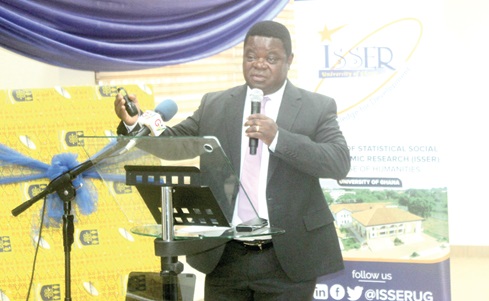The Director of the Institute of Statistical, Social and Economic Research (ISSER), Professor Peter Quartey, has called on the government to remain committed to fiscal prudence and discipline with its expenditure in this year’s general election to help sustain the positive growth in the economy.
He said such a measure would ensure the continuous growth trajectory of the country so far this year, such as inflation, interest rate and exchange rate as compared to the same period in 2022.
"If we break away from election business cycles, we will see a better state of the economy. But if we do not learn from our past mistakes, then we need to brace ourselves for some turbulence or difficult times come 2025," Prof. Quartey added.
The director projected that the economy would grow beyond the four per cent forecast by the International Monetary Fund (IMF) to 4.5 per cent of gross domestic product (GDP) based on the current performance.
Consequently, he said, the government must learn from past mistakes by remaining fiscally disciplined, while it takes strategic steps towards increasing investments into the two key sectors of the economy--agriculture and industry, which, the director said, were labour- intensive.
Launch
Prof. Quartey was speaking at the launch of the State of the Ghanaian Economy Report (SGER) 2023, and a review of the third quarter 2024 economic performance in Accra yesterday.
The SGER 2023 and a review of the third quarter 2024 economic performance is an initiative of ISSER of the University of Ghana (UG).
The SGER is a comprehensive and objective eight-chapter report analysing the performance of various sectors of the economy.
This year marks the 33rd edition of the flagship publication.
The event aligns with ISSER's commitment to promoting knowledge for evidence-based decision-making and sustainable development.
It also seeks to create a platform to discuss the current economic situation and its impact on citizens.
The event was chaired by the Founder and Chief Executive Officer of BigPay Ghana Ltd, Isaac Tetteh.
In attendance were the Head of Economics Division at ISSER, Prof. Ama Fenny; a former Vice-Chancellor of the University of Ghana, Emeritus Prof. Ernest Archtype, and other professionals from different sectors of the economy.
IMF programme
Prof. Quartey further said that the fiscal discipline (consolidation) being witnessed could be based on the ongoing IMF programme.
He suggested a review of the fiscal responsibility law to include legislation of a debt ceiling to ensure that deficits and debt were contained within sustainable thresholds.
The director said the government also needed to ensure expenditure rationalisation, especially in procurement and compensation through digitalisation of the payroll systems.
“We must make sure that all government expenditures across the metropolitan, municipal and district assemblies (MMDAs) are captured under the Ghana Integrated Financial
Management Information System (GIFMIS) system.
“And so, 2024 holds greater growth prospects with some key macroeconomic indicators remaining relatively improved, as compared to 2022.
“However, the true state of the economy will emerge in quarter one of 2025 if we break away from the election business cycle,” he said.
Lending rates
The director also observed that the country’s lending rates remained the highest in the sub-region, hence did not support private sector development.
He also said that the government’s small and medium enterprise growth and opportunity programme should be carefully implemented to address the high lending rate challenge.
The programme proposed a 10 per cent interest rate.
“Addressing inflation and exchange rate depreciation will help reduce the cost of living. Food inflation remains high, and the Planting for Food and Jobs 2.0 should aggressively support the value chain.
“Gold exports account for over 50 per cent of export revenue, but there is the need to ascertain the environmental costs and address them to ensure sustainable mining and agriculture practices.,” the director said.
Services sector
Prof. Quartey also said that the services sector continued to dominate economic activities in the country with key sub-sectors such as information and communications technology (ICT) and tourism driving its performance.
He said average expenditure per tourist rose by about $1,000 to $2,743.19 in 2022, and further jumped to $3,746.65, in 2023.
“This will elude us if the environmental concerns are not addressed. There is also the need to enhance revenue mobilisation through digitalisation, as espoused by the government,” the director added.

